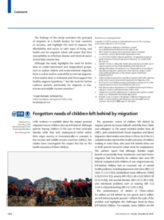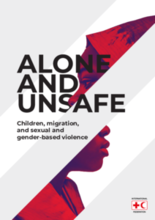Displaying 391 - 400 of 839
This systematic review investigated the effect of parental migration on the health of left behind-children and adolescents in low-income and middle-income countries (LMICs).
In this chapter of Communicating for Social Change, the author presents an analysis of the micro- and macro-level challenges of transnational separation of Overseas Filipino Worker (OFW)-parents and their left-behind children, which consequently beget psychosocial distresses among transnational family members.
This systematic review of children left behind by migrant parents by Gracia Fellmeth and Kelly Rose-Clarke and colleagues in The Lancet included studies from all LMICs, and considered both forced migration and labour migration.
This chapter from Asylum Determination in Europe focuses on unaccompanied minors seeking asylum in Greece and their experiences of residing both in shelters and refugee camps.
The objective of this article is to examine the impact of international female labor migration on left-behind parents by taking into consideration the daughters' marital status.
This study seeks to improve understanding of the risks and types of sexual and gender-based violence faced by children who migrate on their own, as well as the unfortunate and widespread gaps in protection and assistance for these children.
This guidance on reception conditions for unaccompanied children was created by the European Asylum Support Office in order to support the development of reception tools, but also to enable the planning and provision of adequate care for children on the move.
This study sought to assess the combined effects of physical neglect, a major embodiment of the left-behind phenomenon, and the trauma of being left behind on subsequent behavioral problems of children in rural China.
The purpose of this paper is to compare loneliness between the left-behind children of migrant workers and the non-left-behind ones, and identify the most significant predictors of loneliness among the left-behind children.
This paper examines the relationship between the migration of men from rural China and the educational attainment of their left‐behind children.




